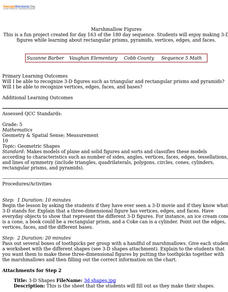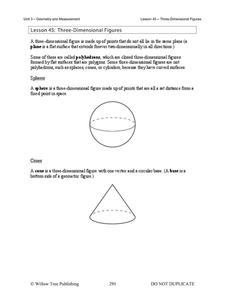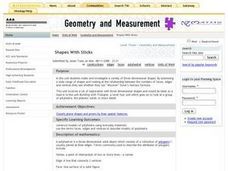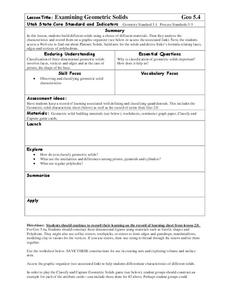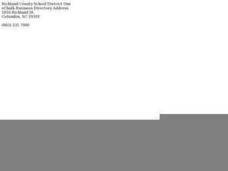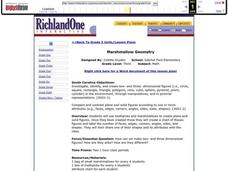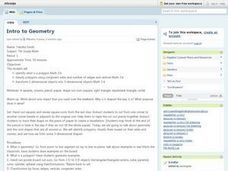Curated OER
Classifying Three-Dimensional Shapes
Compare geometric solids based on their properties. Your emergent geometers use spaghetti and marshmallows to build models so they can examine the number of faces, edges, and vertices on polyhedra of their own creation. Resource includes...
Curated OER
Polyhedra: Faces, Edges, and Vertices (3-D Marshmallow Models)
Third graders explore the attributes of 3-dimensional shapes. In this shapes instructional activity, 3rd graders examine faces, edges, and vertices of 3-dimensional shapes as they construct shapes using marshmallows and toothpicks.
Curated OER
Marshmallow Figures
Students enjoy making 3-D figures while learning about rectangular prisms, pyramids, vertices, edges, and faces. After a lecture/demo, students use marshmallows, toothpicks and a worksheet imbedded in this lesson to create 3 dimensional...
Willow Tree
Three-Dimensional Figures
Time to move into the third dimension! Learn the names of the geometric solids and count faces, edges, and vertices. Then learn to recognize nets that create a given solid.
Curated OER
Marshmallow Geometry
In this three-dimensional shapes geometry lesson, learners identify geometric solids and name their properties. They define "face," "edge," and "vertex," and construct geometric solids using marshmallows as vertices and toothpicks as edges.
Curated OER
Shapes with Sticks
Third graders investigate three dimensional shapes. They examine a variety of shapes and the relationship between the number of faces, edges, and vertices. Students determine Euler's formula and they create a variety of three dimensional...
Curated OER
Polyhedra
Seventh graders explore the characteristics of three-dimensional figures. They compare the nets of figures. Students describe the relationship between the nets draw and the solid. They identify the vertices, edges and faces of the...
Curated OER
Pyramids & Prisms: Guler's Formula
Sixth graders compare and contrast two-dimensional shapes to three-dimensional shapes. After watching a demonstration, they make their own shapes using nets printed on paper. To end the lesson, they use the shapes they made and...
Curated OER
Volume and Surface Area of Right Rectangular Prisms
Students identify the formulas for three-dimensional figures. They use manipulatives to model problems. Students create foldables and explain volume and surface area. Students complete worksheets and classify solids. Students sing a...
Curated OER
Faces, Vertices, Edges
Students identify the parts of three dimensional objects. In this geometry instructional activity, students find the number of faces, edges and vertices. They differentiate between prisms and polyhedra.
Curated OER
3-D Attributes
Students explore geometric solids. In this geometry lesson, students listen to the book The Greedy Triangle by Marilyn Burns, then work in groups to sort geometric solids into various categories. Students define geometric solids...
Curated OER
Examining Geometric Solids
Students explore geometry by completing a math worksheet in class. In this shape identification lesson, students identify the characteristics associated with 15 solid geometric shapes. Students identify patterns between vertices, edges...
Curated OER
Surface Area of Rectagular Prisms
Sixth graders investigate the area of polygons. In this geometry lesson, 6th graders calculate area of prisms using geometric formulas. They work with prisms and other rectangular shapes.
Curated OER
Pyramids and Prisms: Guler's Formula
Sixth graders detect and categorize the attributes of geometric shapes to solve problems. In this geometry lesson, 6th graders construct a variety of polyhedra. Students recognize the relationships between two dimensional and three...
Curated OER
Opening A Cube
Fifth graders investigate mathematical concepts related to the construction of a three dimensional cube. They construct the cube from two dimensional patterns and compute the surface area. Students also define the faces, edges, and...
Curated OER
Marshmallow Geometry
Third graders create 2D and 3D shapes using marshmallows and toothpicks. In this geometry lesson plan, 3rd graders create their shapes and document the number of faces, edges, corners, angles, and sides. They share one shape and its...
Curated OER
How many edges do I need to cut in order to open a cube?
Young scholars problem solve to open a cube to create different shapes. In this problem solving lesson plan, students are given a cube and the shapes to open it up to, and they have to cut the cube open to make certain shapes. This gives...
Curated OER
3-D Figures Part 2
Students work with three dimensional objects. In this geometry lesson, students examine models of spheres, cones, cubes, prisms, and pyramids, and identify them by their edges, vertices, and faces.
Curated OER
Toothpicks, Gumdrops, and Polyhedrons
Sixth graders use toothpicks and gumdrops to make prisms and pyramids. This helps them explore the relationship betweeen faces, vertices, and edges.
Curated OER
Identifying and Classifying Solid Figures
Students identify solid figures. In this classification lesson, students recognize and name solid figures. Students identify which figures contain polygons and rectangles. Students practice counting vertices, faces and edges.
Curated OER
Geometry Journal: Classifying Solids
In this geometry worksheet, 10th graders respond to journal prompts related to prisms and classifying solid shapes. The two page worksheet contains nine questions. Answers are included.
Curated OER
Intro to Geometry
Seventh graders identify a polygon and classify them using congruent sides and number of edges and vertices. Students transform two dimensional objects into three dimensional objects.
Curated OER
Poly-Mania
This hands-on activity takes young geometers on a tour of 2D polygons and 3D polyhedrons. After exploring different web resources and discussing geometric shapes, small groups construct models of polyhedrons using bendable straws. Note:...
Curated OER
Writing Takes Shape!
Students read The Greedy Triangle and discuss geometric solids. In this geometry lesson, students list the geo-solids in the world and create a graphic organizer to show where geo-solids exist.


